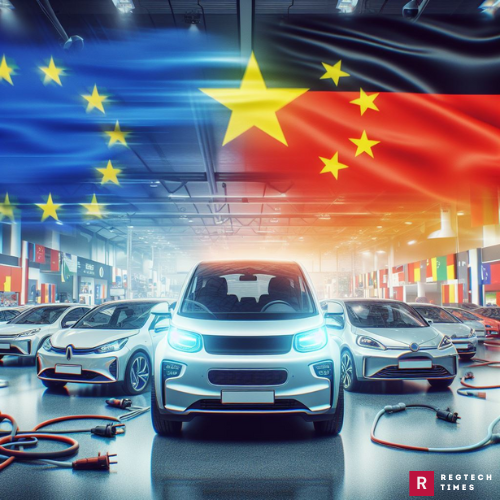German automakers are quite alarmed by the European Union’s probe into Chinese electric vehicles (EVs). Leaders in the industry are concerned about the possibility of prompt retaliation from China as the EU mulls putting duties on Chinese electric vehicle imports. The complicated balance of international trade relations and the vital significance of the Chinese market for European automakers are highlighted by this difficult situation.
EU’s Anti-Subsidy Investigation on Chinese EV
In October, the European Commission opened an anti-subsidy probe, to find out if Chinese electric vehicle manufacturers were receiving improper government subsidies. There is strong evidence from the study that China has been a major source of battery electric car imports, with a 14% increase in imports since the start of the program and many of these imports benefiting from direct government funding or tax incentives.
Potential Tariffs and Their Impact
By June, the EU should have a preliminary list of planned import taxes on Chinese electric vehicles available. The World Trade Organization states that these levies would probably be between 15 and 30 percent. However, an independent assessment conducted by the Rhodium Group indicates that tariffs would need to be between 40 and 50 percent in order to significantly dissuade Chinese EV exports.
The stakes are high: imports of Chinese electric vehicles into the European Union (EU) increased from $1.6 billion (€1.5 billion) in 2020 to $11.5 billion in 2023, accounting for 37% of all EV imports into the union. The competitive environment of Europe’s emerging EV industry may change as a result of the planned levies.
German Carmakers’ Concerns
The protests against the proposed levies are especially loud from German automakers. China is a major source of revenue for companies like Mercedes-Benz, BMW, and Volkswagen. In Europe, for example, BMW imports the iX3 and Mini EVs built in China, and China accounts for over one-third of the company’s sales overall. Oliver Zipse, the CEO of BMW, has issued a cautionary statement regarding the potential negative effects of tariffs, including the possibility of China retaliating.
Protective tariffs have the potential to undermine the substantial industrial advantages that come with operating on a global scale, as Zipse recently noted: “You could very quickly shoot yourself in the foot.”
Mercedes-Benz and VW have comparable concerns. Retaliation is a typical response in trade disputes, as noted by Thomas Schäfer, CEO of the Volkswagen brand, who emphasized the inherent hazards connected with tariffs.
The Role of Overcapacity
The overcapacity argument is a key component of the tariff defense. According to Zipse, the dispute is not primarily caused by overcapacity. He makes the point that non-Chinese enterprises account for more than half of Chinese automobile sales in Europe, while Chinese manufacturers have less than 1% of the market in Germany and Europe.
Beatrix C. Keim, director of the Center Automotive Research’s (CAR) Business Developments & China Projects, concurs that overcapacity is not a major worry. She notes that the Chinese automobile industry is still growing, especially in light of the transition to new energy vehicles (NEVs). In another evidence that overcapacity is being controlled, the Chinese government has now placed restrictions on production licenses.
Fear of Tit-for-Tat Measures
The possibility of a tit-for-tat increase in trade measures is causing European automakers to become increasingly nervous. The head of the Austrian Institute of Economic Research, Gabriel Felbermayr, highlights that in order to prevent a negative cycle of retaliation, EU authorities must carefully consider their options.
The game of tit-for-tat does indeed seem to be under way. The Chinese government may levy taxes of up to 25% on imported cars with huge engines, according to hints made by the China Chamber of Commerce to the EU. The high-end SUVs and sedans that German luxury automakers like Mercedes-Benz and BMW send to China would be severely impacted by such rules.
Conclusion
The EU’s contemplation of tariffs on Chinese electric vehicles is indicative of the larger difficulties in striking a balance between trade protection and reliance on international markets. The stakes are particularly high for German automakers because of their close ties to the Chinese market. The automobile industry has to prepare for possible disruptions and negotiate the intricate world of international trade relations as the EU moves forward with its decision.
The choice to apply tariffs is difficult and ambiguous in this high-stakes scenario, highlighting the interdependence of contemporary economies and the crucial role that strategic diplomacy plays in trade policy.


